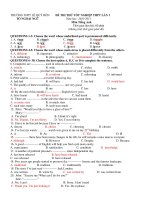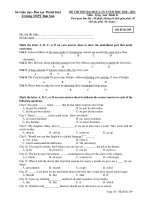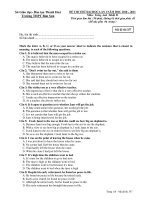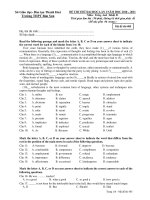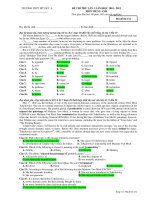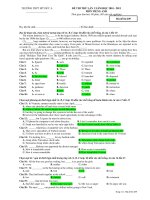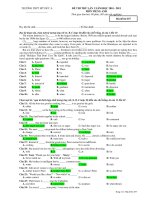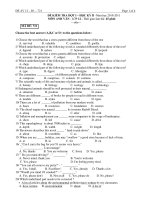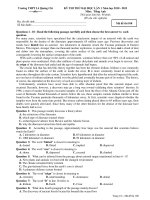ĐỀ THI THỬ LẦN 1 NĂM HỌC 2010 - 2011 MÔN TIẾNG ANH - Mã đề thi 209 ppt
Bạn đang xem bản rút gọn của tài liệu. Xem và tải ngay bản đầy đủ của tài liệu tại đây (197.77 KB, 4 trang )
Trang 1/4 - Mã đề thi 209
TRƯỜNG THPT MỸ ĐỨC A
_________________
ĐỀ THI THỬ LẦN 1 NĂM HỌC 2010 - 2011
MÔN TIẾNG ANH
Thời gian làm bài: 90 phút; (80 câu trắc nghiệm)
Mã đề thi 209
Họ, tên thí sinh: ; Số báo danh:
Đọc kỹ đoạn văn, chọn một từ tương ứng với (A, B, C hoặc D) điền vào chỗ trống, từ câu 1 đến 10
The tourist industry is (1)______ to be the largest industry. Before 1950 one million people traveled abroad each year
but by the 1900s the figure (2)______ to 400 million every year.
(3)______ large numbers of tourists, however, are beginning to cause problems. For example, in the Alps the skiers
are destroying the mountains they came to enjoy. Even parts of Mount Everest in the Himalayas are reported to be
covered (4)______ old tins, tents, and food that have been (5)______.
But at a time when we have (6)______ freedom to travel than ever before, more and more people are asking how they
can enjoy their holidays (7)______ causing problems by spoiling the countryside. Now there is a new holiday (8)______
called "Holidays That Don't Cost The Earth". It tells you (9)______ you can help the tourist industry by asking your
travel agent the right questions (10)______ you go on holiday.
Câu 1: A. figured B. seen C. regarded D. considered
Câu 2: A. rose B. had risen C. has risen D. were rising
Câu 3: A. The B. Those C. These D. Such
Câu 4: A. by B. with C. beneath D. under
Câu 5: A. thrown away B. littered C. launched D. disposed
Câu 6: A. better B. larger C. bigger D. greater
Câu 7: A. apart from B. hardly C. without D. instead of
Câu 8: A. guidance B. direction C. guide D. instruction
Câu 9: A. when B. how C. what D. where
Câu 10: A. as soon as B. after C. before D. when
Chọn một phương án thích hợp nhất (A, B, C hoặc D) điền vào chỗ trống để hoàn thành câu, từ câu 11 đến 15
Câu 11: In Vietnam, summer usually starts in late April, _____.
A. when vast stretches of land were covered with snow
B. while in Africa, the season begins in mid-December
C. but they’re going to change this system to be like the rest of the world
D. however the inhabitants don’t have much opportunity to take advantage of this
Câu 12: _____, but I’d guess he must be about sixty.
A. I’ll phone the company to ask about the price B. I don’t remember how much it costs
C. Frank was horrified to see he was only eight kilos D. I don’t know exactly how old his father is
Câu 13: _____, which has a wonderful view of the harbour.
A. They serve specialities of Turkish cuisine B. Whenever I’m free, I climb up Shooter Hill
C. I’ll show you how to drive it on our way home D. Jason has lived in the same house for 10 years
Câu 14: I’m looking for a _______ for my bedside table.
A. cheap white Taiwanese clock radio B. Taiwanese white cheap clock radio
C. Taiwanese cheap white clock radio D. white cheap Taiwanese clock radio
Câu 15: _____, Barbara was appointed the district manager.
A. How it remarkable seems B. How seems it remarkable
C. How it seems remarkable D. How remarkable it seems
Chọn một từ / cụm từ thích hợp nhất tương ứng với (A, B, C hoặc D) điền vào chỗ trống, từ câu 16 đến 45
Câu 16: All the boys are good at cooking, but _____ is as good as the girls.
A. every B. neither C. either D. none
Câu 17: He ________ on the bed staring at the ceiling, wondering what to do next.
A. laid B. lied C. lay D. lain
Câu 18: They had lunch together in the school _____.
A. bar B. canteen C. café D. restaurant
Câu 19: _____ that she burst into tears.
A. Such her anger was B. Her anger was such C. She was so anger D. So angry she was
Câu 20: We must _____ our pounds for dollars before going to New York.
Trang 2/4 - Mã đề thi 209
A. exchange B. turn C. change D. convert
Câu 21: Peter painted the room black. It looks dark and dreary. He _____ chosen a different color.
A. had to B. should have C. could have been D. must have
Câu 22: Instead of _____ about the good news, Peter seemed to be indifferent.
A. to excite B. to be excited C. being excited D. exciting
Câu 23: She nearly lost her own life _____ attempting to save the child from drowning.
A. with B. for C. at D. in
Câu 24: Tom: "Thank you for your help." - Mary: "_____."
A. With all my heart B. It’s my pleasure C. Never mind me D. Wish you
Câu 25: My brother is intelligent but he _____ common sense.
A. wants B. fails C. lacks D. misses
Câu 26: John never comes to class on time and _____.
A. so does Peter B. so doesn’t Peter C. neither doesn’t Peter D. neither does Peter
Câu 27: "Would you like a beer?" - "Not while I’m _____."
A. on duty B. in order C. in the act D. under control
Câu 28: Their house is _____ near the Cathedral.
A. somewhere B. anyplace C. whereabouts D. anywhere
Câu 29: I’m sorry I _____ your party. I was away at the time.
A. passed B. failed C. lost D. missed
Câu 30: Your room is a mess! _____ it up at once.
A. Do B. Tidy C. Make D. Arrange
Câu 31: The football team won partly because they had been well trained by their _____.
A. teacher B. coach C. instructor D. director
Câu 32: Everyone _____ Tom was invited to the party.
A. but B. as C. for D. from
Câu 33: I don’t think he will ever get _____ the shock of his father’s death.
A. over B. by C. off D. through
Câu 34: We have decided to _____ the money for the local secondary school.
A. raise B. beg C. collect D. rise
Câu 35: Have a good flight and remember to give me a _____ as soon as you arrive.
A. ring B. call C. touch D. phone
Câu 36: Don’t phone me between 8.00 and 9.00. I shall _____ then.
A. be studied B. be studying C. study D. have studied
Câu 37: The existence of many stars in the sky ________ us to suspect that there may be life on another planet.
A. leads B. have led C. leading D. lead
Câu 38: After the enormous dinner he had to _________ his belt.
A. widen B. broaden C. loosen D. enlarge
Câu 39: These people _________ for the most successful company in the town.
A. seem working B. seem to be working
C. are seeming to be working D. are seeming to work
Câu 40: She has been sleeping for 10 hours! You ________ her up.
A. had better to wake B. may wake C. must wake D. would like to wake
Câu 41: He ________ the plants. If he had, they wouldnt have died.
A. can't have watered B. shouldn't water
C. couldn't water D. needn't have watered
Câu 42: When his alarm went off, he shut it off and slept for _________ 15 minutes.
A. other B. the others C. others D. another
Câu 43: On being told about her sack, __________.
A. her boss felt sorry for Mary B. all the other answers are correct
C. Mary was shocked D. Mary's face turned pale
Câu 44: After the ________ of the new manager the staff worked more effectively.
A. resignation B. retirement C. appointment D. dismissal
Câu 45: The doctor took one look at me and said that I was __________ overweight.
A. certainly B. slightly C. continuously D. accurately
Đọc kỹ đoạn văn sau, chọn một phương án đúng nhất (A, B, C hoặc D) cho các câu, từ câu 46 đến 55
Trang 3/4 - Mã đề thi 209
A pilot cannot fly by sight alone. In many conditions, such as flying at night and landing in dense fog, a pilot must
use radar, an alternative way of navigating. Since human eyes are not very good at determining speeds of approaching
objects, radar can show a pilot how fast nearby planes are moving. The basic principle of radar is exemplified by what
happens when one shouts in a cave. The echo of the sounds against the walls helps a person determine the size of the
cave. With radar, however, the waves are radio waves instead of sound waves. Radio waves travel at the speed of light,
about 300,000 kilometers in one second. A radar set sends out a short burst of radio waves. Then it receives the echoes
produced when the waves bounce off objects. By determining the time it takes for the echoes to return to the radar set, a
trained technician can determine the distance between the radar set and other objects. The word "radar", in fact, gets its
name from the term "radio detection and ranging". "Ranging" is the term for detection of the distance between an object
and the radar set. Besides being of critical importance to pilots, radar is essential for air traffic control, tracking ships at
sea, and for tracking weather systems and storms.
Câu 46: What is the main topic of this passage?
A. Types of ranging B. Alternatives to radar C. History of radar D. The nature of radar
Câu 47: According to the passage, what can radar detect besides location of objects?
A. Shape B. Speed C. Weight D. Size
Câu 48: The word "exemplified" in the passage can be replaced by "_______".
A. illustrated B. specified C. justified D. resembled
Câu 49: The word "shouts" in the passage most closely means "_______".
A. shoots B. whispers C. yells D. exclaims
Câu 50: Which of the following words best describes the tone of this passage?
A. Explanatory B. Imaginative C. Argumentative D. Humorous
Câu 51: According to the passage, the distance between a radar set and an object can be determined by ______.
A. the time it takes for the radio waves to produce echoes and bounce off the object
B. the time it takes for a burst of radio waves to produce echoes when the waves bounce off the object
C. the time it takes for the echoes produced by the radio waves to return to the radar set
D. the term "ranging" used for detection of the distance between an object and the radar set
Câu 52: Which type of waves does radar use?
A. Heat B. Sound C. Tidal D. Radio
Câu 53: The word "tracking" in the passage most closely means "_______".
A. searching for B. repairing C. ranging D. sending
Câu 54: Which of the following would most likely be the topic of the next paragraph?
A. The technology used by pilots B. A history of flying
C. Uses of some technology D. Other uses of radar
Câu 55: What might be inferred about radar?
A. It takes the place of a radio B. It was developed from a study of sound waves
C. It gave birth to the invention of the airplane D. It has improved navigational safety
Chọn một câu ứng với (A, B, C hoặc D) gần nghĩa nhất với câu đã cho, từ câu 56 đến 60
Câu 56: Be he rich or poor, she will marry him.
A. She will marry him however poor he may be. B. She doesn’t want to marry him because he is poor.
C. She wants to marry him if he is rich. D. She will marry him whether he is rich or poor.
Câu 57: "When I met my long-lost brother, I was at a loss for words."
A. When the speaker met his brother, he refused to say anything.
B. When the speaker met his brother, he had nothing pleasant to say.
C. When the speaker met his brother, he was puzzled about what to say.
D. When the speaker met his brother, he had much to say.
Câu 58: Donald could not help weeping when he heard the bad news.
A. Donald could not help himself and so he wept.
B. Donald could not help himself because he was weeping.
C. Donald could not stop himself from weeping at the bad news.
D. Donald could not allow himself to weep at the bad news.
Câu 59: I was astonished that she didn’t pass her exam.
A. I was astonished that her exam is not over. B. She didn’t pass her exam, which astonished her.
C. That she failed in her exam astonished me. D. I was astonished that she did pass her exam.
Câu 60: There are many factors contributing to air pollution.
A. Air pollution results in many consequences. B. Air pollution is contributing to these phenomena.
C. Air pollution is the result of burning forests. D. Factors contributing to air pollution are numerous.
Chọn một từ / cụm từ gạch chân cần phải sửa, từ câu 61 đến 65
Câu 61: Physical therapists help patients relearn how to use their bodies after disease or injure.
Trang 4/4 - Mã đề thi 209
A B C D
Câu 62: Many insects make sound because they have no vocal apparatus in their throats.
A B C D
Câu 63: Even on the most careful prepared trip, problems will sometimes develop.
A B C D
Câu 64: Almost all the students were confusing because Ms. Kelly’s explanation was unclear.
A B C D
Câu 65: A secretary told me an important file had left in the lunch room just the other day.
A B C D
Đọc đoạn văn, chọn một câu trả lời (A, B, C hoặc D) thích hợp nhất cho các câu hỏi, từ 66 đến 75
May 7
th
, 1840 was the birthday of one of the most famous Russian composers of the nineteenth century Peter Illich
Tchaikovsky. The son of a mining inspector, Tchaikovsky studied music as a child and later studied composition at the
St. Petersburg Conservatory. His greatest period of productivity occurred between 1876 and 1890, during which time he
enjoyed the patronage of Madame Von Meck, a woman he never met, who gave him a living stipend of about
$1,000.00 a year. Madame Von Meck later terminated her friendship with Tchaikovsky, as well as his living allowance
when she, herself, was facing financial difficulties. It was during the time of Madame Von Meck's patronage, however,
that Tchaikovsky created the music for which he is most famous, including the music for the ballets of "Swan Lake" and
"The Sleeping Beauty".
Tchaikovsky's music, well known for its rich melodic and sometimes melancholy passages, was one of the first that
brought serious dramatic music to dance. Before this, little attention had been given to the music behind the dance.
Tchaikovsky died on November 6
th
, 1893, ostensibly of cholera, though there are now some scholars who argue that he
committed suicide.
Câu 66: With what topic is the passage primarily concerned?
A. The life and music of Tchaikovsky B. The cause of Tchaikovsky's death
C. Tchaikovsky's relationship with Madame Von Meck D. Development of Tchaikovsky's music for ballets
Câu 67: Which of the following is closest in meaning to the word "productivity"?
A. Creativity B. Maturity C. Affinity D. Fertility
Câu 68: The phrase "enjoyed the patronage of" probably means "_________".
A. was mentally attached to B. was financially dependent upon
C. liked the company of D. solicited the advice of
Câu 69: Which of the following could best replace the word "terminated"?
A. Exploited B. Discontinued C. Resolved D. Hated
Câu 70: According to the passage, all of the following describe Madame Von Meck EXCEPT "_________".
A. She was never introduced to Tchaikovsky B. She had economic troubles
C. She was generous D. She enjoyed Tchaikovsky's music
Câu 71: It is known that before Tchaikovsky, _______.
A. music had been famous for its rich melodic passages
B. the music behind the dance had been given very little attention
C. the music behind the dance had been taken seriously
D. serous dramatic music had been already brought to dance
Câu 72: According to the passage, for what is Tchaikovsky's music most well known?
A. Its repetitive and monotonous tones B. The richness and melodic drama of the music
C. Its lively, capricious melodies D. The ballet-like quality of the music
Câu 73: According to the passage, "Swan Lake" and "The Sleeping Beauty" are _________.
A. dances B. plays C. songs D. operas
Câu 74: Which of the following is NOT mentioned in the passage?
A. Tchaikovsky's unhappiness leading to suicide B. Tchaikovsky's influence on ballet music
C. Tchaikovsky's productivity in composing D. The patronage of Madame Von Meck
Câu 75: Which of the following is closest in meaning to the word "behind"?
A. In back of B. Concealing C. Going beyond D. Supporting
Chọn một từ ứng với (A, B, C hoặc D) có trọng âm chính ở vị trí khác so với các từ còn lại, từ câu 76 đến 80
Câu 76: A. permission B. imagine C. possible D. enormous
Câu 77: A. intensity B. disappearance C. scientific D. expectation
Câu 78: A. elaborately B. mysteriously C. necessarily D. originally
Câu 79: A. above B. behind C. under D. toward
Câu 80: A. discover B. normally C. terrify D. activate
HẾT
